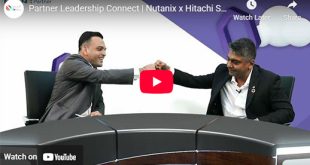The cloud is here to stay, and help save, and the security risks involved are everybody’s responsibility, says Vivek Gupta, Worldwide Vice President – Cloud Services, Trianz. The new technologies – SMAC- is a paradigm that is driving business transformations and will continue to do so as IT industry prospers in India.
Cloud is no longer an innovative technology. How is it faring in India?

Indeed, Cloud has become an essential technology globally. In fact, I would go as far as to say, a few years back, question was “what can really move to Cloud”; Today that question is “what can an organization not move to Cloud”?
Forrester Research predicts that 40% of IT spending globally will be on Cloud services by 2020. Recently, Gartner was also quoted as saying that the public cloud services market in India is projected to grow 30.4 % in 2016 to total $1.26 billion, with the highest growth coming from cloud system infrastructure services and platform as a service.
While the adoption in India is not at global levels, it is increasingly gaining traction across industries. Start-ups and SMEs have adopted cloud in a Cloud-first and/or SaaS applications way. Enterprises are leading the charge towards Digital Transformation; and cloud is a key pillar of this transformation (along with the rest of SMAC forces). With the availability of “India Region” from Cloud providers like AWS and Azure, even industries like BFSI are beginning to look at Cloud seriously.
One key element that Trianz has noticed is that there are not many doubts on security on the cloud as it was earlier, . Clients are more informed about the options that are available to secure their apps & data with a click of a button. We believe that high availability of the basic infrastructure is a given, and we only need to offer ways to add value to the client’s business with a consultative approach.
Has Trianz been able to address all security concerns around it?
Security is a shared responsibility between a cloud provider and the customer. Trianz has a multi-pronged approach to successfully address all aspects of Cloud Security:
- Governance (enforcing organizational policies and access mechanisms across usage of Cloud services)
- Cloud Infrastructure (best practices & automation around securing Cloud infrastructure/services)
- Cloud Applications (best practices for OS, middleware and app security)
- Data Protection (integrity, confidentiality & availability) and
- Ongoing security events monitoring, Security/Compliance Audits
Nevertheless, Security remains a key concern among cloud customers; it is a continuous process of client training and diligent security design & implementation.
Trianz also helps companies with Vulnerability Analysis and Penetration Testing services to ensure that the client is assured of covering all bases when on the cloud.
You have worked with AWS, probably the forerunner of cloud services globally. How have you seen the demand patterns over the last few years?
Although Start-ups and SMEs have been adopting cloud faster, in the enterprise segment we have seen the demand increase only in the last year or so. There is an acceptance that cloud is the next destination and we only can be happy that there is enough and more on the plate for us. Clients are adopting a different strategy in their journey to the cloud. Some enterprises want to move only web workloads and non-core applications to the cloud while some are choosing to move it all .
We are witnessing a growing demand from enterprises for roadmaps, governance structures, phase wise deployments, optimizations and management of cloud platforms. At Trainz, we have the framework and methodology to help clients in their end- to-end journey to the cloud.
Trianz also offers digitization. Do you see an upsurge with the Digital India movement? Do you have any play in it?
Recently, a daily newspaper mentioned that by the end of 2016, the Government will be spending about $7 billion on IT products and services. The ‘Digital India’ initiative continues to drive investments and expansion of broadband services in the government, so more and more citizen services can be accessed on mobile devices (part of the mobile government). Also, a few months ago Gartner projected India to remain the world’s fastest growing IT market in 2016, as it is expected to spend more than $72 billion on IT services, products, and hardware. And, this growth is backed by the digitization wave catching up with Indian companies and the growing number of connected devices that form the Internet of Things (IoT). At present, even though businesses are tightening their purse strings, the need to support digital business is more urgent than ever. To make that happens, leaders are engaging in tough cost optimization efforts in some areas to fund digital business in others. The advent of cloud software is helping organizations optimize costs.
Enterprises in India are leading the way towards Digital Transformation. Clients are willing to take the long journey from digitization to transforming operational processes (encompassing partners, suppliers, and employees) and to transforming user (customer) experience. While a Mobile application is one visible aspect of this journey, many backend biz processes are also changing to support this transformation. Trianz’s Digital Transformation framework enables our clients to move along with a well-planned Digital course.
Analytics seems to drive most organisations today. What is your value addition to your clients for this tool?
Trianz looks at Analytics as having two parts:
Enterprises are generating more and lot more data; this data needs to be made usable across the organization. Trianz Information management addresses these aspects from Data Governance, Data Management, and Master Data Management perspectives.
Once Enterprises have usable data, Trianz has analytics services to enable the following:
- Information delivery to be consumed for Data Warehousing, Business Intelligence usage
- Basic Insights to discover & understand the patterns coming out of data
- Advanced Insights to be able to model predictive scenarios
Most of these can be done on Cloud at far lower costs to provide users with petabyte-scale processing, faster turn-arounds and make it accessible in a self-service manner across the organization.
One visible key element is that companies now want a solution on predictive analytics and are more than willing to invest to get it right.
Trianz has been on the forefront of this development, and has recently received the UNICOM Analytics Award, ranking among top 20 Big Data services firm by Silicon Review, which is a testimony of our unique value proposition to our clients.
What kind of tools and services do you offer in the current nature of security threats.. APTs maybe?
Trianz believes that compliance, security-related reporting, and breaches are not just a CIO’s responsibility but that of Boards and CEOs. Organizations have to develop a top-down, 360-degree view of security- at the perimeter, in the applications, during transactions, in wireless data exchanges and on devices. Organizations need to know that protecting information is like protecting their own house against a theft. Trianz’s security services address this mission.
Information security policy & audits, application security & testing, infrastructure security & testing and data management & statutory compliance, are the key service areas of Trianz. Our clients realized the outcomes in terms of:
- Regulatory Compliance With Information Security Audit Lifecycle Management
- Enhanced Operational Efficiency With Managed Security Operation (SecOps)
- Uninterrupted Customer Experience By Continuous Cyber Security Assessment And Assurance
- Data-Analytics Based Enterprise Security Metrics For Predictive Security Measures
What is your policy for channel partners for the cloud? What kind of support do you provide for enhancement of the solution and providing greater value to clients?
Trianz works with various technology partners to provide a seamless experience of using applications either on-premise or on Cloud. Further, we work with clients to take advantage of advanced PaaS and application-oriented services that a Cloud may provide. These could be in the form of analytics services, server-less computing, machine learning, web application firewalls, cloud governance tools like CMP and so on.
 Latest Technology News Today – Get Latest Information Technology Updates and Services Latest Technology News Today – Get Latest Information Technology Updates and Services
Latest Technology News Today – Get Latest Information Technology Updates and Services Latest Technology News Today – Get Latest Information Technology Updates and Services 









